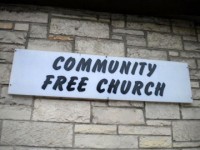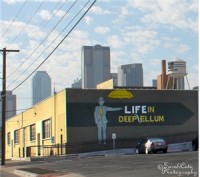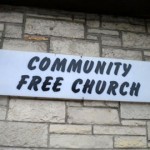 I always find it ironic that many of our churches have the word “community’ plastered on the side of the building, but few churches actually make the building available to the community.
I always find it ironic that many of our churches have the word “community’ plastered on the side of the building, but few churches actually make the building available to the community.
Apparently, the community church is only open to the community of people who attend the services.
And when someone inquires about renting the building for a wedding, a funeral, or a support group, we tell them they need to come to church on Sunday, sign release forms, pay a deposit and rental fee, and if they get approved, refrain from drinking, smoking, or swearing on the premises.
But if we viewed our building not as “the church” but simply as a building that the church meets in on an occasional basis, then the conflict of what happens in the building the rest of the week disappears.
Where would you meet if you didn’t have a building?
Let me put it another way. If your church did not have a “church building” you would probably have to rent a school gymnasium, a theater, a hotel conference room, or some other sort of multi-purpose building.
In such cases, do you care too much about what happens in those rooms the rest of the week? Of course not. As long as the room is clean on Sunday morning, do you care that on Friday night in the hotel conference room you rent, there was a wedding party with lots of drinking, loud music, some cursing, and a few people “hooked up” afterwards? No, you don’t care because it is not your building, the hotel can do what they want with that room, and the church that meets there on Sunday morning is not profaned by what went on in the same room on Friday night.
This is how churches should view their own buildings. There is nothing holy or sanctified about the church building, any more than there is anything holy or sanctified about the school gymnasium or hotel conference room.
To help redeem our building in this way, it might be best to fully transform the use and availability of our church building. It might be a good idea to recreate church around the current cultural forms of community.
Become a community center with a church
Rather than be a church which has a coffee table, we can become a coffee house that has a church. Rather than be a church that offers Wednesday night aerobics, we can become an aerobic and dance center that has a church.
This is beneficial on multiple levels. For example, the building doesn’t sit empty most of the week, the business helps pay the bills, and the gathering center creates opportunities to make connections with the community.
 Churches of this type are popping up all over the country. For example, Life in Deep Ellum is a Cultural Arts and Community Center in Dallas, TX. They have a coffee shop called Mokah, a state-of-the-art music venue for concerts, and an expansive gallery for art exhibits. The building also houses a film company, a graphic design company, and a life-coaching and counseling service.
Churches of this type are popping up all over the country. For example, Life in Deep Ellum is a Cultural Arts and Community Center in Dallas, TX. They have a coffee shop called Mokah, a state-of-the-art music venue for concerts, and an expansive gallery for art exhibits. The building also houses a film company, a graphic design company, and a life-coaching and counseling service.
Oh, and on Sunday, a church meets there too.
Remember, the church is not a building. In the case of Life in Deep Ellum, the building is owned and managed by a group of people who are part of the church. The building is a community center, and the church, as part of the community, meets in the building. The church is not front and center; the community center is. The church is not the focal point of the building; the coffee shop, art gallery, and music venue is.
Do you want to redeem your church building? Open it up to the community. Aside from this allowing us to accomplish the church’s intended mission, this may have the added benefit of helping pay the mortgage, and helping us develop friendships with others.




Nice words, Jeremy
This is really a very complex issue. Based on my experience as a former property manager for a large church, I doubt that most church properties can be “redeemed”. In addition to tax issues, liability issues are a very significant concern, as are conflicting demands for the facilities, damage to facilities and so on.
Sharing, rather than owning, facilities is an option that may work for some groups. But this is not an inexpensive option in many cases. You might want to contact some local community centers and see what is involved in renting them for a wedding reception, birthday party or similar function. In California, this is costly, especially when you factor in the necessary liability insurance, on-site manager, charges for damaged or missing items, pay for police presence if alcohol is served, etc. Smoking and alcohol are banned at many facilities because of damage problems and liability issues, not because of a moral stance.
How about we, the followers of Jesus, get to really know people? Maybe we can know a thousand, maybe a dozen. Let’s live life together. Celebrate. Thank God for His gifts. Love each other. Care for each other. Laugh together. Weep with one another. We can do it in the places of normal life – our homes, offices, parks, cafes & streets. Instead of building temples and calling them “the house of God” or “church”, how about we use the money to help our neighbors who need help, whether they live next door or halfway around the world. That looks so much like Jesus.
Yes, it is a complex issue. You are probably right about the impossibility of doing this. I have never been a property manager, especially not of a church, and so didn’t realize all the legal complexities of some of the things I was proposing. I may have to rethink and rework this idea.
You are right though about moving away from the building altogether. It looks so much like Jesus.
You’re so kind, Jeremy! I don’t want to be negative about the possibilities of redeeming the building. There are hundreds of thousands of churches in the USA alone. Surely some can figure out ways to do it.
What I suspect will happen, however, is that some groups are going to find that they can’t afford to keep their buildings. Some of these buildings and/or the property on which they are situated are valuable and will readily sell. Hopefully the church will take the proceeds and invest them in the community, which could include the world community. (I know this won’t always happen.)
I’m just wondering here – Would some church boards who are struggling to pay expenses respond positively to a book that conveys something along the lines of “How Your Church Can Save Money, Invest in the Community and Love Your Neighbors” with a subtitle of “Rethinking the Need for a Church Building”?
That is a great question. As I am working toward publishing, I constantly battle between the desire to be gentle and the necessity to say things in a way that stand out. So many people are saying the same things today that sometimes, it needs to be said in a way that ruffles some feathers.
Are you thinking of writing a book with the idea you mentioned? I think church boards might respond positively to it, if you could get them to read it.
But then, I don’t know. For many today, the church building is like the Ark of the Covenant – hands off lest you die!
Although ecclesiology interests me, such a book is not on my radar. I still have to finish the last seven and one half books of the series I started – the sci fi bio. And – I don’t want to mess with their Ark lest they nail me to something.